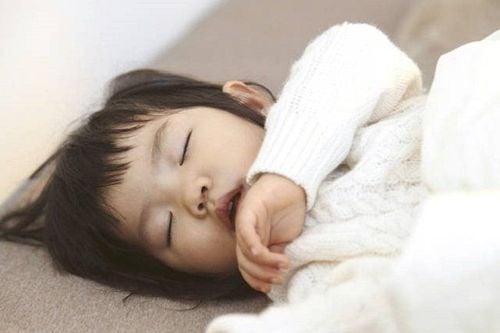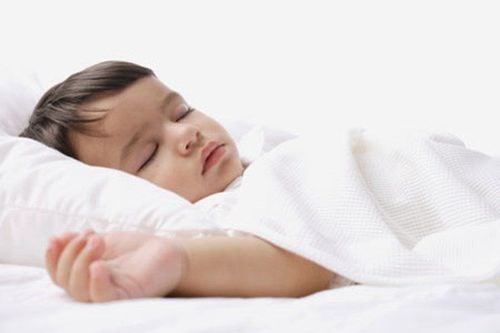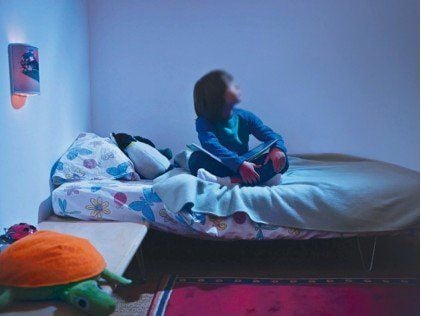This is an automatically translated article.
The meaning of sleep for children is an essential foundation for mental and physical health, helping children grow up and do well in school. Accordingly, children who do not sleep well are sometimes a problem for parents. At this point, understanding children's sleep needs is the first step to helping them sleep better and get the rest they need to grow up strong and healthy.
1. The role of sleep in children's health
The meaning of sleep for children is extremely important for the development of children's brains. In addition to directly affecting children's satisfaction and happiness index, research shows that children's sleep also affects alertness and attention, memory, calculation, language learning and fine motor skills. skillful.
In addition, sleep also has important effects on growth, especially sleep in the neonatal period. Accordingly, children who do not sleep deeply, often fussy children will have slower growth than children who sleep fully.
2. What happens when children do not sleep well?
As every parent knows, a child's lack of sleep can swing between irritability and hyperactivity, with effects possibly similar to those of ADHD. Sleepiness can also affect a child's ability to pay attention, affecting school performance. Even minimal sleep restriction can affect a child's daily life. In addition, some studies show that up to a quarter of children under the age of 5 do not get enough sleep. This is worrisome because inadequate sleep in childhood has been linked to allergic rhinitis and immunodeficiency, causing restlessness and stress. There is also evidence that children who do not get enough sleep can lead to future cardiovascular risks such as obesity, diabetes and high blood pressure.
In older children, if they do not get enough sleep, academic performance will be delayed; At the same time, mental health and social skills are also affected. Furthermore, it is a risk factor for substance abuse and psychological health problems as well as more immediate problems such as car accidents and sports injuries.

Không ngủ đủ giấc có thể ảnh hưởng rất nhiều tới trẻ.
3. Common childhood sleep problems
Problems that seem small to adults are often very important to a child, so surrounding events such as teething, illness, moving to another place, changing caregivers, changing Schedule changes or minor annoyances like allergies, colds and ear infections can all affect children's sleep.
Accordingly, some of the most common childhood sleep disorders may be:
Nightmares and fears Nightmares can be scary for toddlers, who have more difficulty in distinguishing what is real and what is fake. Children often wake up from nightmares, which often occur during REM sleep. If this happens, reassure the child and gently put him or her back to sleep.
Night terrors, also known as night terrors, is an insomnia that occurs early in the night during non-REM sleep in about one-third of children. Children may scream and stand up straight during the night terrors, but they often don't wake up or remember the incident in the morning. The best thing a parent can do is to make sure their child is safe at all times, and try to keep them in bed if possible. There is no need to wake your child or worry too much if he or she experiences night terrors from time to time. However, if the child has it too often or if the child is sleepy during the day, parents should visit the pediatrician.
Sleepwalking and sleepwalking Sleep talking is a relatively common sleep-related insomnia, occurring more often when children do not get enough sleep. Therefore, proper sleep hygiene can help reduce these abnormalities. Although napping in itself is harmless, it can disturb others in the bedroom. On the other hand, early sleep is sometimes associated with other sleep disorders such as nightmares or sleepwalking.
Research shows that 1 in 3 children will sleepwalk before age 13, with most nightmares occurring during the pre-adolescent years. Similar to sleepwalking, children with sleepwalking are unaware of their surroundings and often have no recollection of the activity upon awakening. In addition to daytime sleepiness, sleepwalking can have serious consequences depending on the actions of each child.
Therefore, if a child often sleepwalks, it is better for parents to secure the child's bedroom and set an alarm. Waking someone up about half an hour before a frequent sleepwalking episode has been shown to be helpful.
Snoring and Sleep Apnea Just like adults, it's normal for children to snore from time to time. Snoring in children can be caused by swollen tonsils or adenomas, allergies, obesity, passive smoking, or other factors. However, if you notice that your child snores excessively or shows signs of pauses in breathing and then gasping for air, he may have sleep apnea.
Children with sleep apnea have a breathing disorder that causes them to wake up many times during the night without them noticing. The first evidence that something is wrong may be when parents notice signs of sleep deprivation, such as daytime sleepiness, difficulty concentrating, and hyperactivity. Frequent snoring and sleep apnea can adversely affect a child's health as well as disrupt sleep for other family members.
Restless leg syndrome Restless leg syndrome is manifested by the image of a child's legs having to move constantly. Parents may think that the child is simply restless or hyperactive.
Treatment of restless legs syndrome at night in children is through proper sleep hygiene and bedtime stretching. Iron supplements have been shown to be helpful in treating adults, but research is underway on the safety and effectiveness of iron supplements for children.
4. Sleep hygiene measures for children
Daytime habits also affect sleep. Parents can facilitate a comfortable sleep in their child by following basic sleep hygiene rules:
The child's day schedule should be balanced between rest and activity. Keep a regular bedtime. Do not leave the television in the child's bedroom. Participate in physical activities or outdoor activities. Set the thermostat in the room to a slightly cooler temperature. Use dark curtains to block light or use a night light if your child is afraid of the dark. Keep your child's bedroom quiet. Consider using a white noise machine if the environment is noisy. Do not give your child food, drinks containing caffeine, do not eat too much or sweet food before going to bed. Give your child a light snack or a glass of warm milk before going to bed. Turn off computers, screens, video games, and other bright lights when it's time to go to bed. Choose a favorite stuffed animal or blanket. Besides, parents also need to know that the best time to put their children to sleep is when they are sleepy, not when the children are asleep so that the children learn to put themselves to sleep. If your preschooler wakes up in the middle of the night, put him back in bed. It is best not to let an infant sleep in a parent's bed, as co-sleeping increases the risk of sudden infant death syndrome.
In short, if you think that a child does not sleep well or that the child may have a sleep disorder, parents need to monitor the symptoms in the child's sleep diary, promptly correct it with simple steps such as: above. If the condition does not improve, parents should consult a pediatrician as soon as possible. This is because establishing good sleep hygiene habits will ensure what sleep means for children, help them get a good night's sleep, and ensure their all-round development.
Please follow the website: Vinmec.com regularly to update many other useful information.
Reference articles: sleepfoundation.org, racgp.org.au, helpguide.org, webmd.com, hoihendumdlstphcm.org.vn, msdmanuals.com, benhvienhitrunguong.gov.vn













